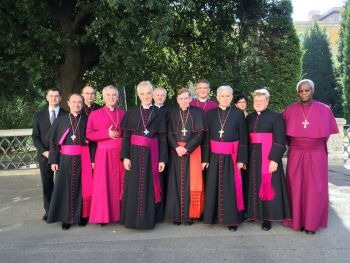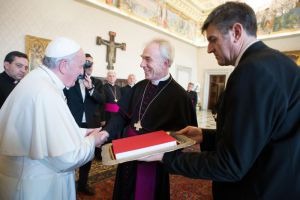Clergy Robes for Men
Bishop in the Catholic Church
Bishop in the Catholic Church

In the Catholic Church, the position of a bishop holds great significance. Bishops are ordained clergy who are entrusted with the responsibility of overseeing a specific geographical region, known as a diocese. They play a crucial role in the administration, spiritual guidance, and sacramental life of the Church. This article explores the role and responsibilities of a bishop in the Catholic Church, their selection process, and the significance they hold within the religious hierarchy.
Understanding the Role of a Bishop
A bishop is a high-ranking member of the Catholic clergy who is responsible for shepherding and guiding the faithful within their diocese. They are considered successors of the apostles and are entrusted with the mission of spreading the teachings of Jesus Christ. Bishops are expected to be spiritual leaders, teachers, and shepherds of their flock. Shop Bishop Cassock Now.
The Selection and Appointment Process of Bishops
The process of selecting and appointing bishops is rigorous and involves extensive consultation. The Pope, who is the head of the Catholic Church, plays a crucial role in the selection process. The Pope, aided by a team of advisors, evaluates the needs of the diocese and carefully considers potential candidates. The final decision rests with the Pope, who appoints the chosen candidate as a bishop.
Episcopal Ordination and Symbolism
Episcopal ordination is the ceremony through which a bishop receives the fullness of the sacrament of Holy Orders. During this sacred ritual, the bishop-elect is anointed with sacred chrism, receives the laying on of hands, and is presented with the symbols of his office, including the miter and the crozier. These symbols represent the bishop’s authority and pastoral care.
The Responsibilities of a Bishop
- One of the primary responsibilities of a bishop is to provide pastoral care to the priests, deacons, and faithful within his diocese. This involves guiding the spiritual growth of the faithful, offering guidance and support to clergy, and fostering a sense of unity and community among the faithful.
- Bishops are responsible for the administration and governance of their diocese. This includes overseeing the finances, properties, and personnel within the diocese. They also establish policies and guidelines to ensure the smooth functioning of the Church.
- Bishops are the only clergy with the authority to ordain priests and deacons. They also play a crucial role in administering the sacraments of Confirmation and Holy Orders. Through these sacraments, bishops strengthen and empower individuals for their life of service to the Church.
- Bishops actively engage in ecumenical and interfaith dialogue to foster understanding, cooperation, and unity among different Christian denominations and religious traditions. They strive to build bridges and promote harmony through dialogue and mutual respect.
- Bishops are advocates for social justice and charity. They speak out against injustice, promote human rights, and encourage the faithful to actively participate in works of charity and service to others. Bishops often address societal issues and promote a culture of solidarity and compassion. Shop Bishop Cassock Now.
Bishops in the Historical Context
Throughout history, bishops have played significant roles in shaping the Catholic Church and its teachings. Many bishops have been influential theologians, scholars, and defenders of the faith. Their contributions have left a lasting impact on the development of Catholic doctrine and spirituality.
The Bishop’s Relationship with the Pope
Bishops maintain a close relationship with the Pope, who serves as the spiritual head of the Catholic Church. The Pope provides guidance, support, and leadership to bishops worldwide. Bishops are accountable to the Pope and collaborate with him on matters concerning the Church’s mission and teachings. Shop Bishop Cassock Now.
Challenges Faced by Bishops
Bishops face numerous challenges in their role as spiritual leaders. Some of the common challenges include:
- Bishops are called to address and respond to scandals and controversies within the Church. They must ensure transparency, justice, and accountability in handling such situations while working towards the healing and restoration of the faith community.
- Bishops oversee a vast number of clergy and parishioners within their diocese. They must provide guidance, support, and discipline when necessary, ensuring the spiritual well-being of all those under their care.
- Bishops often face the challenge of balancing the rich traditions of the Church with the demands of the modern world. They must adapt to changing societal needs while preserving the timeless teachings and values of the Catholic faith.
The Significance of Bishops in the Catholic Church
Bishops hold a significant role within the Catholic Church. Their authority, leadership, and pastoral care provide stability, unity, and guidance to the faithful. Through their sacramental ministry and moral teaching, bishops ensure the transmission of the Catholic faith from generation to generation. Shop Bishop Cassock Now.
Bishops in the Catholic Church are entrusted with the spiritual and administrative oversight of their dioceses. They play a vital role in fostering unity, guiding the faithful, and promoting the teachings of Jesus Christ. Their responsibilities encompass pastoral care, governance, ordination, and social justice advocacy. Bishops face challenges but also contribute to the growth and development of the Catholic Church, both historically and in the present.

 Clergy Cassocks for Men
Clergy Cassocks for Men Clergy Cassocks for Women
Clergy Cassocks for Women Clergy Robes for Women
Clergy Robes for Women Clergy Shirts for Men
Clergy Shirts for Men Clergy Shirts for Women
Clergy Shirts for Women